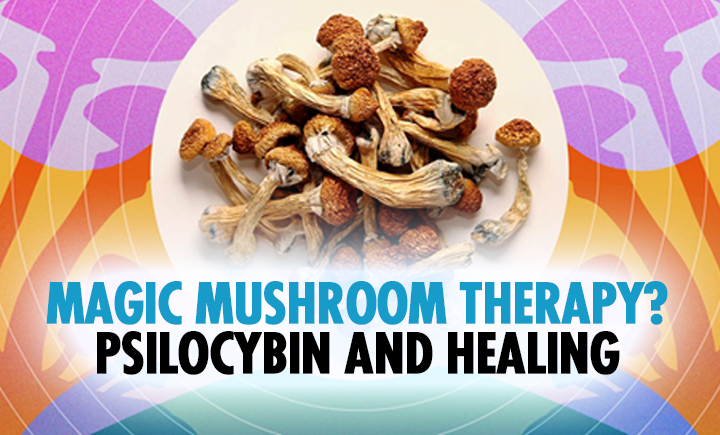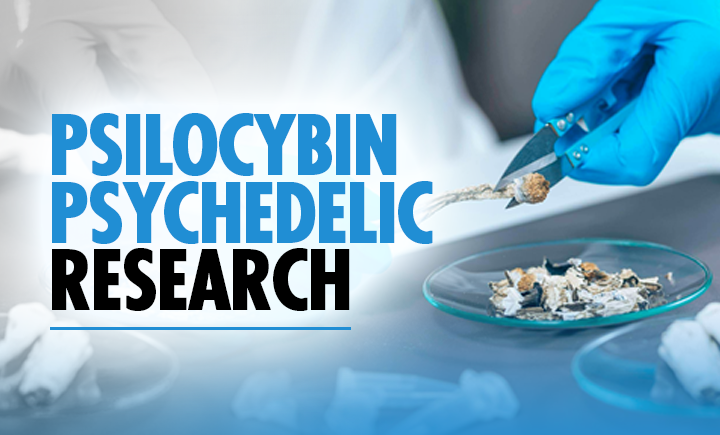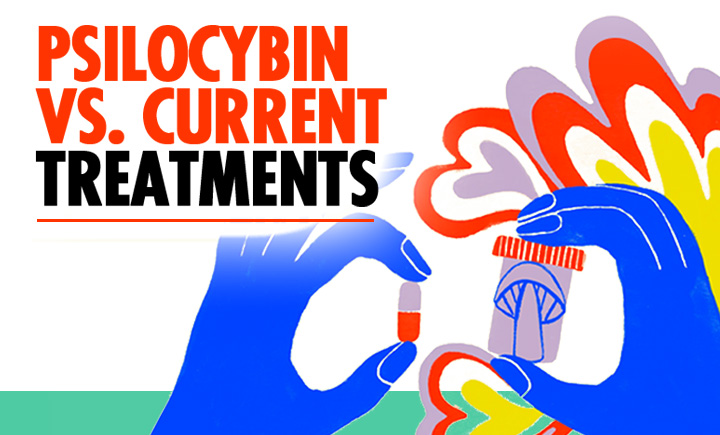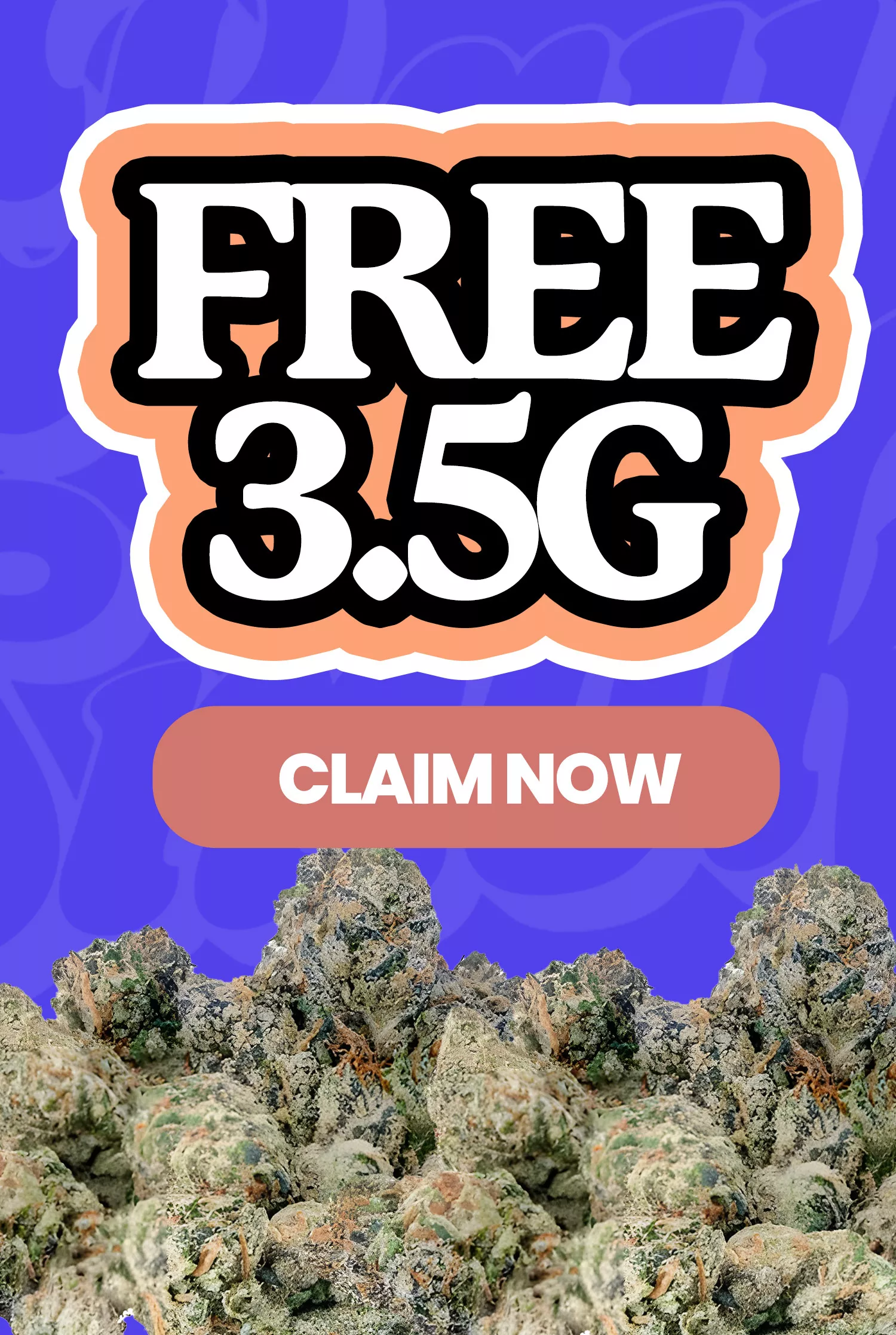Magic Mushroom Therapy? Psilocybin and Healing

Magic mushrooms have long been celebrated for their hallucinogenic, recreational properties. But over the past few years, scientists, psychiatrists, and doctors are coming to believe that magic mushrooms, specifically their active compound psilocybin, warrant serious attention as a possible healing therapy for different diseases and ailments.
The positive effects and results achieved in psilocybin-assisted therapy clinical trials and studies to treat afflictions like depression and PTSD make doctors and researchers think closely about the healing effects of magic mushrooms. Psilocybin is opening up a world of treatments more powerful and sophisticated than what’s currently out there.
Prominent fans of psilocybin and magic mushrooms, like mycologist Paul Stamets and entrepreneur Tim Ferriss are speaking loudly and publicly about how psilocybin has helped them expand their consciousness — and also heal from trauma.
Paul Stamets’s website highlights mushroom research for their magic and regular health benefits. Tim Ferriss said, “Psychedelics have saved my life several times over, including helping me to heal from childhood abuse.” Ferriss has been instrumental in helping fund research into psychedelic drugs and psilocybin mushrooms.
Generally, there’s a sense of growing excitement for psilocybin in the research community and beyond.
Psilocybin Psychedelic Research
Major research institutions like New York, Johns Hopkins, and Columbia Universities are investigating psilocybin for its effects on various mental health conditions — and neurological ones, too.
Psilocybin is an unusual chemical psychedelic compound — a tryptamine compound — found in roughly 200 species of mushrooms. According to the Hopkins Center for Psychedelic Mushroom and Consciousness Research site, “the molecular structure of psilocybin… allows it to penetrate the central nervous system.” This penetration into the nervous system makes it a potentially effective therapeutic agent to change lives and “rewire the brain.”
While researchers don’t fully understand the mechanism by which psilocybin works, they’ve observed that it affects the brain’s serotonin levels rather than dopamine. Serotonin is a neurotransmitter that affects mood and cognition (among other functions). It is the chemical that most anti-depressants like selective serotonin reuptake inhibitors (SSRIs) target.
That means that psilocybin’s effects are more about restoring a sense of wellness rather than giving you the pleasure hits that drugs like alcohol and tobacco provide (which can then become addictive).
Research suggests that individuals seeking to develop a more open personality — to be more imaginative, creative, and broad-minded — could benefit from psilocybin. This is groundbreaking, as Hopkins researchers state that human personalities do not typically change after age 30.
Much of the excitement around psilocybin is because its mood-enhancing effects are immediate, but the beneficial effects can last for months. During this time, psychotherapy can be used to be more effective, turbocharging psychological gains.
Research into psilocybin and its applications is ongoing. Read on to learn about some of the areas researchers are investigating regarding the healing properties of psilocybin.
Terminal Cancer-Related Distress
Patients with terminal cancer can suffer from many ailments, including:
- Physical pain
- Psychological anguish
- A sense of hopelessness
- Thoughts of suicide
Standard treatments like chemotherapy can also have side effects like nausea and neuropathy.
NYU Study
A clinical trial led by NYU Langone Medical Center researchers shows that a single dose of psilocybin for psychedelic treatment, combined with psychological counseling, “significantly lessens mental anguish in cancer patients for months at a time.” The effects are long-lasting without additional doses, and it has no significant adverse side effects. One dose of psilocybin was effective for more than six months in 80% of the 29 test subjects.
Some patients in the study reported that psilocybin treatment occasioned a profound spiritual shift within them. They reported feeling:
- Unusual peacefulness
- Spiritual feelings
- Increased feelings of altruism
- Improved relationships with their families
- Greater quality of life
The study’s facilitators noted that psilocybin should not be used without proper supervision and that some groups of patients, like people with schizophrenia and adolescents, should not be treated with it.
Nevertheless, the study provided help to people facing anguish during terminal cancer with long-lasting effects. Three to four years after the study, there was a follow-up survey of still-alive participants. These patients overwhelmingly attributed their positive life changes to the psilocybin experience. It remained a deeply meaningful and spiritually significant experience for them.
Johns Hopkins Medicine Study
A small double-blind study led by Johns Hopkins University noted a similar easing of existential anxiety in people with life-threatening cancer. A single dose of psilocybin helped people with cancer see meaning in their lives and overcome feelings of despair while increasing:
- Quality of life
- A sense of meaning in life
- Optimism
Some 67% of those involved in the Johns Hopkins study reported that it was one of their life’s top five most meaningful experiences. Roughly 70% ranked it as one of the top five most spiritually significant events in their lifetimes.
A small minority of participants (15%) experienced side effects like nausea. This small percentage is insignificant when considering the impact of cancer and conventional treatments.
Anxiety and Burnout
Rates of anxiety and depression among U.S. adults were four times higher between April 2020 and August 2021 than in 2019, owing to pandemic stress. Even pre-pandemic in 2018, American anxiety levels rapidly increased, particularly among young adults. Anxiety is unpleasant in itself, but it also brings a host of negative physical symptoms:
- Headaches
- Extreme fatigue
- Raised blood pressure
- Increased risk of heart disease
- Potential development of Irritable Bowel Syndrome (IBS)
- Potentially weakened immune system
If anxiety becomes chronic, it can severely limit the sufferer’s quality of life and lead to a lower life expectancy.
Psilocybin is showing positive results when it comes to anxiety. One dose of psilocybin can catalyze the therapeutic process in combination with talk therapy. The psilocybin dose speeds up how quickly patients open up, leading to profound insights reached more quickly than with talk therapy alone. Using psilocybin can help patients find motivation and meaning more rapidly, which counteracts anxiety and depression.
Some studies caution against adolescents using psilocybin, but one recent study showed that it could benefit adolescents with social phobia. The effects of social phobia can be crippling and lead to a withdrawal from activities integral to a healthy, happy human existence. Under proper supervision, psilocybin could help neurotic adolescents rework their personalities to allow them to flourish as adults.
Bottom line: Psilocybin, in conjunction with psychotherapy, could be a promising treatment for severe anxiety disorders.
Depression
Major depression can be debilitating. Its signs change for different individuals, but it involves:
- A loss of enjoyment in daily activities
- A pervasive sense of hopelessness and distress
- Change in sleep patterns and appetite
- Difficulty in maintaining relationships
- Difficulty in performing essential tasks
According to many psychologists, the inability to see meaning in life is one of the leading underlying causes of depression and despair. This is where psilocybin therapy excels.
Some research shows that psilocybin seems to subdue the brain’s ego center, the claustrum. Perhaps this is why people who have experienced psilocybin therapy can access a greater sense of spirituality and a bigger picture. It could be the feeling of selflessness that enriches users’ lives.
A recent Johns Hopkins study showed that two doses of psilocybin and supportive psychotherapy led to immediate relief for people with major depression for at least a month. Half of the study’s participants achieved remission of their depression through the month-long follow-up — about four times larger than the effectiveness of traditional anti-depressants on the market. Psilocybin also worked faster without the undesirable side effects of anti-depressants.
Another study involving Columbia University and the New York State Psychiatric Institute concluded that psilocybin could be effective for individuals with major depression who are treatment-resistant. A higher dose (25 mg) of psilocybin produced results in three weeks, sustained three months later. About 90% of adverse effects were considered mild to moderate.
Another recent study published in the New England Journal of Medicine showed that psilocybin was as beneficial as Lexapro, a popular anti-depressant, with perhaps a slight edge on secondary outcomes.
When using psilocybin as a treatment for depression, it can only take a short handful of sessions to make a lasting impact. This is distinct from conventional anti-depressants, which can be prescribed for years and don’t rewire the brain.
The effects of psilocybin regarding depression seem to be long-lasting, providing much-needed hope for the millions of Americans trailed by the “black dog.”
Post-traumatic Stress Disorder
Post-traumatic stress disorder (PTSD) afflicts many people who have suffered traumatic events, such as:
- Car accidents
- Natural disasters
- Intense violence or assault
- Military combat
PTSD makes it hard for those suffering to move on and engage in normal daily behavior. Symptoms of PTSD may include:
- Flashbacks
- Nightmares
- Debilitating anxiety
- Uncontrollable thoughts about the initial trauma that sparked it
Current PTSD treatments are psychotherapy, like cognitive behavioral therapy (CBT), and anti-depressants in the form of SSRIs and antipsychotics. These have not proven effective and, in the case of antipsychotics, can have undesirable side effects.
Unlike suppressing memory formation like anti-depressants, psilocybin may stimulate nerve cell regrowth in the hippocampus, allowing for the regeneration of emotion and memory. That’s exceptionally hopeful, as it means people who have PTSD can start anew rather than just trying to block out old memories.
Studies in mice show that low doses of psilocybin erased the conditioned fear response. This could be promising for people with PTSD who are constantly sent back into their memories and find it impossible to move past them. It could allow people with PTSD to uncouple the fear response triggered by environmental cues.
There are risks in using psilocybin for PTSD, including flashbacks and “bad trips,” which is why dosing psilocybin under professional supervision is essential. But the benefits could be enormous, especially since current treatment is lacking. Since psilocybin worked successfully as an anti-depressant and anti-anxiety medication at NYU, as mentioned earlier study, it stands to reason that it could work to ease PTSD as well.
Addiction to Tobacco and Alcohol
Addiction is complex. Psychiatrists and researchers are still studying how to classify it and why some people are more prone to addiction than others. What is certain is that many people would love to be free of their harmful addictions to tobacco and alcohol.
One small Johns Hopkins study showed that long-time smokers could quit cigarettes after a carefully controlled program of psilocybin. After six months, 80% of study participants still abstained, a much higher success rate than traditional smoking cessation drugs.
This research suggests the potential usefulness of psilocybin in helping individuals who suffer from addictions. The brain-changing ability of psilocybin seems capable of helping with the cravings and dependency associated with chemicals like nicotine — and maybe other substances, too, potentially including opiates.
An online survey of over 300 people with Alcohol Use Disorder (AUD) published in the Journal of Psychopharmacology suggests that psychedelics, including psilocybin, could be helpful as a treatment for alcoholism. After the psychedelic experience, 83% of the survey takers no longer met the AUD criteria.
For those worried that using psilocybin to treat addiction may replace one addictive substance with another, UW’s Dr. Nathan Sackett notes that “psychedelics don’t interact with same reward pathways as drugs like alcohol, tobacco, cocaine, or opioids,” so the risk of overuse or substance abuse is significantly less.
Migraines
Migraines are intense headaches that involve symptoms such as:
- Visual hallucinations or distortions in the visual field
- Throbbing pain in the head, face, and neck
- Nausea
- Sensitivity to bright light and loud sounds
- Irritability or other mood changes
Migraines are common, but effective treatment (as well as palliatives for cluster headaches) has been elusive. Studies have shown that psilocybin may play a role in controlling migraines and that one dose of psilocybin has lasting therapeutic effects in lessening their intensity.
Psilocybin vs. Current Treatments
Based on current research, the advantages of psilocybin for mental health challenges seem to be as follows:
- Fast-acting relief
- Long-lasting effects
- Few side effects, none of which seem extreme
- A greater sense of ultimate meaning and connection
Psilocybin acts on the brain differently than anti-depressants and has longer-lasting effects. Once patients stop taking anti-depressants, they often relapse to their former patterns of thought and behavior. This relapse into old patterns is not the case when taking psilocybin.
Common side effects of anti-depressants can include headaches, weight gain, insomnia or sleepiness, and sexual problems. They can also take time to work, and finding the right one can involve trial and error by practitioners, which can be unpleasant for patients.
By contrast, a single dose of psilocybin to treat depression combined with talk therapy had immediate results, leading to greater openness and excitement about life. If any, side effects like nausea and headaches were mild to moderate and dissipated quickly. Psilocybin has also shown promise in treatment-resistant depression, providing hope to those who have tried all the available treatments and found them unhelpful.
One patient who had battled depression for thirty years was quoted in The Guardian following his treatment with psilocybin: “I became a different person… I couldn’t wait to get dressed, see people in the outside world. I was supremely confident – like when I was younger before the depression started.” Personal statements like that one are increasingly reflected in the scientific literature.
With PTSD, an NYU study published in the Journal of the American Medical Association reported that most patients who pursued existing talk therapies still fit the diagnostic criteria for PTSD after completing treatment. By contrast, a dose of psilocybin combined with talk therapy has been shown to relieve PTSD-afflicted populations.
Psilocybin for Healing: Conclusion
Even though psychedelics have a complicated legalization past, the amount of interest and positive studies emerging may mean that magic mushroom therapy sessions could become a mainstream therapeutic technique in the near future.
It shows real promise when it comes to complex psychological conditions like PTSD, obsessive-compulsive disorder, major depressive disorder, and neurological conditions like migraines that afflict millions of Americans. Additionally, psilocybin’s consciousness-expanding properties are helpful in mental health care for treating common mental illnesses like depression and anxiety, whether concerning severe physical sickness like cancer or for other reasons.
Therapists caution that using psilocybin may not always be pleasant and may stir up short-term feelings of discomfort and even anxiety (before it’s dispelled). Psilocybin should be taken under the supervision of a trained therapist who can help guide a patient through these complicated feelings to the hoped-for sense of greater understanding and well-being.
While researchers caution that more studies are needed, it seems all but inevitable that psilocybin is set to play a central role in treating debilitating ailments in the years to come.


